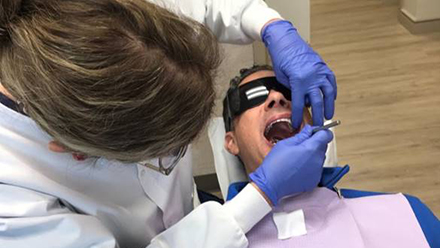Oral Cancer Screenings - Millersville, MD
Protecting Your Smile Health & Overall Wellbeing
Oral cancer and cancers that impact other parts of the face, throat, head, and neck are serious due to the often aggressive nature of these cancers, they have an unfortunately high mortality rate. One person dies every hour in the US from oral cancer, and only 57% of those diagnosed will live more than five years beyond their initial diagnosis. Even though these statistics are still pretty alarming, the numbers have actually improved in the last decade. Prior research indicated that between 45 and 50% of diagnosed patients would live beyond the five year mark. The reason for the gradual improvement in numbers may be due in part to the increasing frequency of preventive screenings. This is one of the reasons why the McCarl Dental Group dentists are so dedicated to offering oral cancer screenings for our Millersville, MD dental patients. Keep reading to learn a little more about what you can expect from oral cancer screenings with our team. If you have questions or want to schedule an appointment, don’t hesitate to reach out to our dental care team.
Why Choose McCarl Dental Group for Oral Cancer Screenings?
- Millersville’s trusted name in dentistry since 1938
- State-of-the-art dental office
- Caring team of dentists and smile specialists
Warning Signs & Symptoms of Oral Cancer
Many forms of oral cancer and cancers that affect the head, neck, and face can be very aggressive, and with the proximity to your brain and nervous system, these forms of cancer can quickly interrupt healthy function. For these reasons, early diagnosis and intervention are essential. To help your dentist or physician make an accurate diagnosis as soon as possible, you should let us know if you notice any of these warning signs of oral cancer:
- Red, white, or otherwise discolored soft tissue in the mouth
- Lump or sore in the mouth
- Lumps on other parts of the head, face, or neck
- Changes in color or texture of soft tissue
- Difficulty chewing and swallowing
- Sore throat or chronic hoarse voice
- Sores in the mouth that don’t heal properly
- Unexplained pain or tenderness in the mouth, lips, or face
- Difficulty moving tongue
What Does My Dentist Look for During an Oral Cancer Screening?
During your oral cancer screening, the dentist will be looking for those common symptoms of oral cancer outlined above. If we notice discoloration, sores, and other issues in the soft tissue of your mouth, we may ask you to tell us a little more about your habits, health history, and family health history to ensure we fully understand your risk for oral cancer. We will also look for lumps and bumps on the face, throat, head, and neck that can be indicative of other forms of oropharyngeal cancer.
What Happens During an Oral Cancer Screening?
When you visit for a six month dental checkup, we’ll complete your oral cancer screening as part of your preventive visit. The process itself is simple and comfortable. We will carefully examine every surface of your mouth looking for lumps, bumps, sores, changes in texture, and other warning signs. We will feel your neck for lumps. It’s likely we’ll also ask you some questions to determine your risk for oral cancer and make sure that any changes to your oral health are detected in the earliest stages. If you smoke or use tobacco products, drink excessively, have been diagnosed with HPV, or notice any of the warning signs of oral cancer listed above, make sure to let your dentist or a team member know you’re concerned about oral cancer.
Oral Cancer Screening FAQs

Oral cancer is a disease no patient wants to experience. When undergoing screenings at our dental office in Millersville, it’s natural to be a bit apprehensive about what your dentist might find during their examination. You likely have many questions that you want to ask, especially if they find something of concern. We never want our patients to feel scared or unsure about any type of care we provide, so we’re here to answer some of the most pivotal questions posed to our team by our patients. Feel free to review the following information and give us a call if you need additional clarity about oral cancer treatment.
